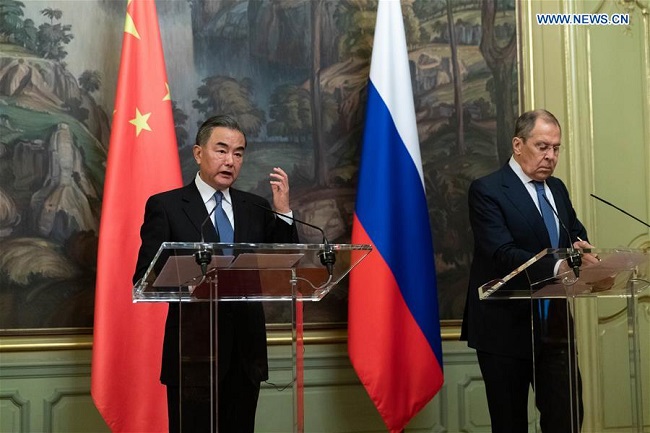China, Russia should strengthen cooperation in four areas: senior Chinese official

Chinese State Councilor and Foreign Minister Wang Yi (L) and Russian Foreign Minister Sergei Lavrov meet the press after their talks in Moscow, Russia, on Sept. 11, 2020. (Xinhua/Bai Xueqi)
China and Russia should strengthen cooperation in the fight against COVID-19 and other areas to promote bilateral relations, Chinese State Councilor and Foreign Minister Wang Yi said on Friday.
After 70 years of hardships, China-Russia relationship has become more mature, more stable, and more dynamic, Wang said at a press conference after meeting with his Russian counterpart Sergei Lavrov in Moscow.
While commending the achievements of China-Russia relations, Wang said, "We must think deeply how we can maintain, consolidate and develop our bilateral relationship in the new situation," adding that it is not only related to the development and revitalization of the two countries and the well-being of their peoples, but also has exemplary significance globally.
Therefore, the two sides should strengthen cooperation in four areas, said the Chinese top diplomat.
First, China and Russia should be supporters for international cooperation in the fight against COVID-19, Wang said.
Facing the pandemic, the international community needs unity instead of selfishness, collaboration instead of blame-shifting. China and Russia are willing to work together with all parties to firmly support the World Health Organization, do a good job in normalizing epidemic prevention and control, and make vaccines a universally accessible public product for the whole world.
The irresponsible act of releasing "political virus" instead of controlling the spread of the novel coronavirus should be opposed, so as to nurture a sound political environment and favorable public opinion for international cooperation in the fight against COVID-19, he said.
Second, the two countries should be examples of major powers living in harmony, Wang said.
Being each other's largest neighboring country, China and Russia are the world's largest countries in terms of population and territorial area respectively, he said, noting that the larger a country's size, the greater its responsibility.
The two sides will take the implementation of the consensus of the two heads of state as the core task, continue to deepen mutual political trust and strategic cooperation, push forward the docking of the Belt and Road Initiative (BRI) with the Eurasian Economic Union, and promote the mutually beneficial development of the BRI and the Greater Eurasian Partnership, and set an example for cooperation between major powers, Wang said.
Third, the two sides should be leaders in cutting-edge science and technology, Wang said.
China and Russia have huge complementary advantages and potential for cooperation in the development of science and technology. They will take advantage of the Year of Scientific and Technological Innovation between the two countries, vigorously develop and implement strategic projects, deepen cooperation in the transformation of scientific and technological achievements, promote talent exchanges, and encourage high-tech and Internet companies to start businesses and invest in the other country, providing scientific and technological support for the pragmatic cooperation between the two countries and their respective national economy and people's livelihood, he said.
Fourth, the two countries should be guardians of international fairness and justice, Wang said.
This year marks the 75th anniversary of the end of World War II and the founding of the United Nations (UN), and the international community is faced with a historic test that needs it to make a choice between multilateralism and unilateralism, and between cooperation and confrontation, he added.
As permanent members of the UN Security Council and major emerging economies, China and Russia are willing to work with the international community to firmly safeguard the core position of the UN in international system, abide by the purposes and principles of the UN Charter, reiterate the commitment to multilateralism, actively reform and improve global governance system, advocate the construction of an open world economy, and join hands to build a community with a shared future for mankind, Wang said.


